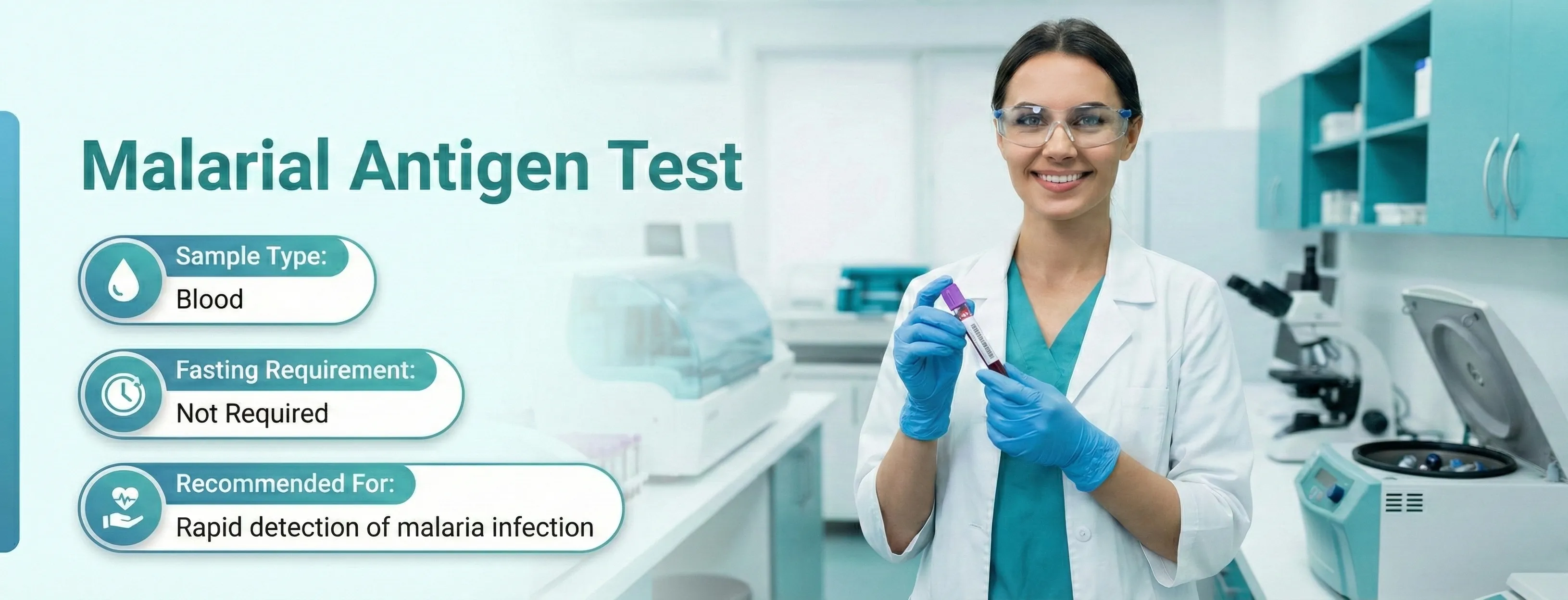163+ orders placed in your location
100% NABL & ISO Certified Lab • 100% Accurate Reports
Malarial Antigen Test
MP by card, RDT(Rapid Diagnostic Test) for malaria, Rapid malarial diagnostic test, RMT, MAT
- SummaryThe Malarial Antigen test detects specific proteins (antigens) from Plasmodium parasites in the blood, which cause malaria. It provides a rapid diagnosis, often within minutes, and helps identify the type of malaria parasite. The test is performed using a blood sample and fasting is not required.Read more
- Reports Within12 HrsView Sample Report100% NABL & ISO Certified Labs
- SampleBlood
- AgeAll Age Group
- GenderMale and Female
- FastingNot Required
PharmEasy Promises
Know More About The Test
A quick info on Malarial Antigen Test
Overview
The malaria antigen test is used for the diagnosis as well as detection of malaria in individuals. This test requires blood samples from patients who might have few of the symptoms of malaria. The malaria antigen test results can also be obtained faster than most other tests.
Malaria is an infectious disease that is brought about by Plasmodium parasites. Female Anopheles mosquitoes are responsible for the spread of these parasites. Four main types of Plasmodium species are known to infect humans, Plasmodium vivax, Plasmodium falciparum, Plasmodium malariae, and Plasmodium knowlesi.
After the mosquito bites a human, the parasites gain entry into the bloodstream from where they travel to the liver. The incubation period for malaria is generally 7 to 30 days. The malarial parasites enter inside the red blood cells after the incubation period and bring about their lysis within 48 to 72 hours, leading to malaria symptoms. Few species of Plasmodium are capable of remaining dormant in the liver and can re-enter the bloodstream months or years from the initial infection. The malarial antigens can only be detected when the parasites enter the red blood cells after their incubation in the liver.
A few of the common symptoms of malaria are fever, headache, chills, sweat, malaise, and body pain. Few people develop gastrointestinal symptoms such as diarrhoea and vomiting. Doctors prescribe malaria antigen tests looking at these symptoms.
The symptoms begin to appear after the parasites leave the liver and enter into the bloodstream, where they multiply. Plasmodium falciparum is capable of causing severe malaria that can be life-threatening.
The incidence of malaria is very common in India. India accounts for 3 per cent of malaria cases and deaths of the world and 85.2 per cent of Southeast Asia cases. India has been successful in reducing malaria cases by 17.6 per cent in 2019 as compared to 2018.
Although India has been implementing effective malaria control, the incidence of malaria is still quite high. Stricter guidelines and control methods need to be implemented to make India malaria-free.
Sample Type
The malaria antigen test requires blood samples collected from an arm vein, also known as a venipuncture. Antigen tests are preferred to get an early diagnosis of malaria or also when a microscopic diagnosis is not easily available.
Risk Assessment
Malaria, Internal bleeding, Liver failure, Seizures
What does this test detect?
The malaria antigen test helps in the detection of the Plasmodium antigen in the blood that is collected from individuals.
Indications for Malarial Antigen Test
The test is prescribed for individuals who have the following symptoms:
- Fever
- Sweat
- Headache
- Nausea and vomiting
- Body pain along with malaise
- Weakness
- Anaemia due to disruption of the red blood cells
During the later stages of infection, the symptoms get more serious and may include:
- Mild symptoms of jaundice
- Liver enlargement
- Rare cases of cerebral malaria are seen where the parasite reaches the brain
- Seizures
- Bloody stools
- Mental confusion
Individuals from regions that are prone to malaria are found to have an altered immune system due to the higher frequency of the infection. Apart from getting bitten by mosquitoes, you can also contract malaria in other ways, such as blood transfusion from an infected person. Malaria can also be transmitted from mother to child during pregnancy.
How frequently should you take this test?
The Malaria antigen test is not a routine test that needs to be taken periodically. Doctors prescribe this test to patients who have symptoms of malaria.
The doctor must be made aware of all the signs and symptoms you are experiencing along with time.
Test Preparation
Before the Test
In general, there is no specific preparation required for a malaria antigen test. However, if this blood test is done in conjunction with another test that necessitates specific preparation, your doctor may recommend avoiding certain foods. Kindly seek guidance from your doctor for the best possible outcome.
During the Test
A small amount of blood will be drawn from a vein in your arm. Here's what to expect:
- The expected puncture site will be meticulously cleaned with antiseptic.
- A tourniquet will be secured around your arm to enhance vein visibility.
- A needle will be carefully inserted into the vein to draw the blood, which may cause a brief pinching for a few seconds.
- The collected blood will be placed into a vial or small tube, labeled with your information.
After the Test
Following the blood draw you can expect:
- A bandage will be applied to the needle-insertion area to prevent further bleeding.
- Minor bruising is common. What is uncommon is feeling lightheaded. If you feel dizzy, it is recommended to sit down for a few minutes.
- If you observe any bleeding, pain, or a rash at the site of the needle, please contact your doctor promptly.
Parameters
The malaria antigen test involves collecting blood samples from suspected patients. The blood samples comprise the specific malaria antigen. The test involves the detection of this antigen from the blood.
The antigen can differ depending on the species of Plasmodium that causes the infection. For example, histidine-rich protein 2 (HRP2) is a specific antigen for Plasmodium falciparum. There are a few antigens, such as Aldolase, that are common for all the Plasmodium species. Thus Aldolase can be used for the detection of all Plasmodium species, whereas HRP2 can be used only for the detection of Plasmodium falciparum.
Test Result Interpretation
The malaria antigen test involves the collection of blood samples. These samples are used for the detection of specific malaria antigens. The blood sample is placed on a well that is a part of the rapid diagnostic kit.
The test kit comprises two lines of antibodies, the control antibodies and the capture antibodies. The control antibodies determine the validity of the test, whereas the capture antibodies help to determine the presence of malaria antigens.
If the results show two or more lines, it indicates that the test is positive and there is the presence of malaria antigens in the blood. If the result shows only one line, then it indicates that the test is negative and no malaria antigens are present in the blood.
The malaria antigen test is an effective and quick technique to detect the presence of malaria infection. Most often, the malaria antigen test results are accurate; however, one can also obtain false-positive results.
The malaria antigen test is often followed by blood smears for confirmation as well as determination of the extent of infection. A rapid diagnostic test has been approved by the U.S. Food and Drug Administration (FDA) for usage in hospitals and diagnostic centres.
Severe malaria infection can become deadly, so early diagnosis is important. Travellers travelling to endemic regions are advised to take medical advice before travelling and carry personal protection against mosquito bites. A few of the important steps for protection are sleeping under mosquito nets, wearing light-coloured and loose fitted clothes along with long pants, and using mosquito repellants.
Price/Cost
The pricing for a Malarial Antigen test fluctuates based on the location and the laboratory. Typically, the cost of a Malarial Antigen test falls within the range of INR 299 to INR 489. Here's a breakdown of the average expenses for a Malarial Antigen test in various major cities across India:
City | Min Price | Average Price | Max Price |
Malarial Antigen Test Price in Bengaluru | 299 | 394 | 489 |
Malarial Antigen Test Price in Chennai | 299 | 394 | 489 |
Malarial Antigen Test Price in Delhi | 299 | 394 | 489 |
Malarial Antigen Test Price in Hyderabad | 299 | 394 | 489 |
Malarial Antigen Test Price in Kolkata | 299 | 394 | 489 |
Malarial Antigen Test Price in Lucknow | 299 | 394 | 489 |
Malarial Antigen Test Price in Mumbai | 299 | 394 | 489 |
Malarial Antigen Test Price in Nagpur | 299 | 394 | 489 |
Malarial Antigen Test Price in Patna | 299 | 394 | 489 |
Malarial Antigen Test Price in Pune | 299 | 394 | 489 |
Risks and Limitations
The malaria antigen test is a conventional blood test that is unlikely to trigger complications. But contact your physician immediately if you experience the following problems:
- Continuous bleeding from the needle insertion site.
- Pain or swelling at the site of blood collection.
Limitations of the test
- Intervention in the outcomes of tests by errors from the equipment or humans.
- Wrong understanding of the marker
Was This Test Information Helpful?
Please rate your experience
References
People Also Ask
How is the malaria antigen test done?
Can CBC detect malaria?
What is an MP antigen test?
What tests are done to diagnose malaria?
How soon can malaria be detected?
Have any doubts? Ask us.
Ask us anything about the Malarial Antigen Test to understand it better
Explore More at PharmEasy
Top-Selling Healthcare Products
Top-Searched Medicines
We provide trusted, expert-curated health content to support better awareness,prevention, and care.
Backed by experienced doctors, medical experts, and strict editorial standards.


